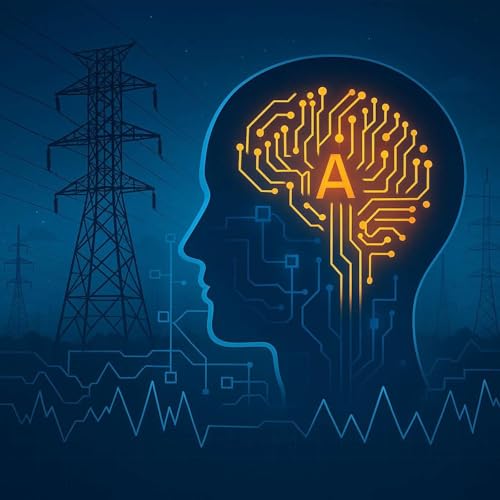
The Five Convergences (Part VI of VI): AI as an Ethical Challenge
カートのアイテムが多すぎます
カートに追加できませんでした。
ウィッシュリストに追加できませんでした。
ほしい物リストの削除に失敗しました。
ポッドキャストのフォローに失敗しました
ポッドキャストのフォロー解除に失敗しました
-
ナレーター:
-
著者:
このコンテンツについて
Artificial intelligence is becoming the “cognitive infrastructure” layer of the U.S. power grid, promising breakthroughs in efficiency, reliability, and renewable integration. But as the latest episode of AIxEnergy makes clear, those same tools introduce profound ethical challenges that the industry cannot afford to ignore.
In this conversation, host Michael Vincent and guest Brandon N. Owens unpack the ethical dimension of AI in energy—framed as the fifth and final convergence in Owens’s Five Convergences framework. At stake is nothing less than the balance between innovation and public trust.
The discussion begins with framing: AI is already helping utilities forecast demand, optimize distributed energy, and even guide major investment decisions. Yet the risks are real. These systems often function as opaque black boxes, raising alarms about transparency and explainability. In critical infrastructure, operators and regulators need to understand how decisions are made and retain the authority to challenge them. Researchers at national labs are developing “explainable AI” tailored to the grid, including physics-informed models that obey the laws of electricity, while utilities lean toward interpretable algorithms—even at the cost of some accuracy—because accountability matters more than inscrutable predictions.
Bias and equity emerge as the next ethical frontier. Historically, infrastructure decisions often mirrored race and income, leaving behind patterns of inequity. If AI learns from this history, it risks perpetuating injustice at scale. Algorithms designed to minimize cost, for example, might consistently route new projects through low-income or rural areas, compounding past burdens. Similarly, suppressed demand data from underserved neighborhoods could lead AI to underinvest in precisely the places that need upgrades most. Experts urge an “energy justice” lens: diverse datasets, bias audits, and algorithmic discrimination protections. Done right, AI could flip the script, targeting investments toward disadvantaged communities instead of away from them.
Accountability and oversight add another layer of complexity. If an operator makes a mistake, regulators know who is responsible. But if an AI misfires, liability is unclear. Today, the U.S. has no dedicated policies for AI on the grid. RAND has called on agencies like the Federal Energy Regulatory Commission, the Department of Energy, and the Securities and Exchange Commission to set rules of the road, starting with disclosure requirements that show where AI is deployed and who validated it. Proposals for “trust frameworks” and certification regimes echo safety boards in aviation—clarifying responsibility between human operators, utilities, and AI vendors.
The conversation then turns to building ethical frameworks. At the federal level, the Department of Energy stressing that AI must remain human-in-the-loop, validated, and ethically implemented. Certification models, behavior audits, and even an “AI bill of audit” are on the table. Meanwhile, nonprofits and standards bodies are developing risk management frameworks and algorithmic impact assessments that treat AI ethics like environmental impact reviews.
Emerging solutions are already being tested. Engineers are deploying fairness-aware algorithms, running digital twin simulations to validate AI before deployment, and using explainable dashboards to make recommendations intelligible. Hybrid systems pair complex models with transparent rule-based checks. Independent audits, standards compliance, and mandatory AI risk disclosures are moving from proposals to practice. Equally important, utilities are beginning to form ethics advisory panels that bring in community voices, ensuring public values shape the systems that will affect millions of customers.
Closing the episo
Support the show


